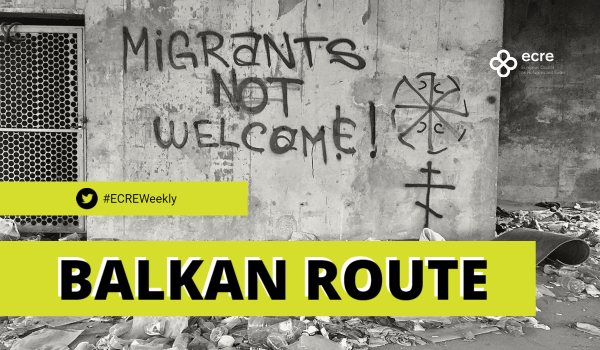EU’s biometric digitalisation in Western Balkans expands the concept of migration externalisations and undermines access to rights, European Border Violence Monitoring Network (BVMN) finds. The increased presence of Serbian and foreign officers in Serbia and along its borders leads to evictions and denial of rights. Bosnia and Herzegovina seeks to finalise an agreement with Frontex for “better stability and control.” The Spanish residency and Commissioner Ylva Johanneson call on member states to facilitate the entry of Bulgaria and Romania into the zone despite mounting reports of pushbacks.
The latest report by the European Border Violence Monitoring Network (BVMN) investigates the development of interoperable biometric databases, akin to Eurodac, in the Western Balkans, referred to as the “Balkandac” system and its impact on migration policies and data-sharing frameworks in the EU. The report finds out that “a dangerous paradigmatic shift in the methods for handling new arrivals to the EU” undermines the right to asylum and fortifies the outsourcing of responsibility for managing applications to third states. It also concludes that “the increasing overlap or interconnection of migration and criminal databases has the potential to contribute to the mounting unjust criminalisation of people on the move—further exacerbating difficulties in accessing asylum and international protection.”
A new blog by ASILE Project highlights the changing landscape of securitisation in Serbia since the increased presence of the European Border Agency (Frontex) officers along the shared borders with Hungary and Bulgaria. According to the article, 140 Frontex officers have been deployed by April 2023 together with other foreign officers in Serbia, facilitated by bilateral and tri-lateral arrangements with EU member states such as Austria and Germany. These recent EU and Serbian developments have contributed to a heavily securitised turn in Serbia’s response to refugees and migrants, with harmful impacts on the health and well-being of people migrating across the country. Mobile teams of Medecins sans Frontieres (MSF) noted an increase in “securitised measures” aimed at preventing people from reaching the Hungarian border in the first place. MSF teams also reported that local and foreign law enforcement personnel interrupted their activities while providing humanitarian assistance to migrants in informal settlements in northern Serbia, and on one occasion, they raided the settlements causing evictions of migrants. According to general MSF monitoring data, at least 50 evictions, which involve the demolition of makeshift camps, destruction of personal property, and the use of violence, harassment, and verbal humiliation, took place in informal settlements along the Serbo-Hungarian border region between December 2022 and June 2023. MSF also noted that these evictions increase the cost and difficulty of onward movement while the risk of apprehension forces migrants to stay hidden and increases reliance on smugglers. ECRE member Asylum Protection in Serbia have long documented mass evictions by Serbian authorities and harsh conditions in informal settlements while repeating that fortress EU policies facilitate the business of smuggling. The organisation wrote on X that they met a migrant named Khaled on 29 November who struggles to eat in a camp hosting 300 women, men and children from Syria, adding that an appointment with a specialist was taken to monitor Khaled’s health situation.
Minister of Security in the Council of Ministers Nenad Nešić said that the agreement between Bosnia and Herzegovina and Frontex should be signed by the end of the year to get “better stability and control”. “We will get additional control when it comes to the movements of illegal migrants,” said Nešić, while underlining that there is “no fear of a new migrant wave in BiH”. Meanwhile, around 500 people are currently staying in two reception centers in the Una-Sana Canton (USK), stated the International Organization for Migration (IOM) in BiH. More than 300 migrants and refugees are staying in the Lipa Reception Center while 100-150 people are staying at Borići center in Bihać. The head of the IOM Mission in Bosnia and Herzegovina, Laura Lungarotti, said that “the available accommodation capacities in the four current reception centers on the territory of Bosnia and Herzegovina are more than sufficient at this moment” while adding that the majority of migrants don’t stay for so long in the country as they tend to transit quite quickly on their way to Western Europe.
European Commissioner for Home Affairs, Ylva Johansson, reaffirmed her commitment to seeing Bulgaria and Romania integrated into the Schengen Area this year. Johansson expressed her optimism following a successful fact-finding mission in Bulgaria underlining both countries’ readiness to join the zone. Spanish Interior Minister Fernando Grande-Marlaska, who believes that “A stronger Europe is a Europe with Romania and Bulgaria as full members of the Schengen Area,” called for a joint effort to facilitate the entry of both countries into Schengen. However, Austria has been opposing the accession of Romania and Bulgaria, arguing that “Schengen must become better and not bigger” while the Netherlands blocked the entry of Bulgaria into the zone over issues related to rule of law. Irish MEP, Clare Daly, stated that “Bulgaria must not be forced by the Commission to be the EU’s brutal military border guards”, while referring to a report by the Left in the European Parliament documenting testimonies of pushbacks in Europe including in Bulgaria.
For further information:
- ECRE, Balkan Route: Increased Arrivals in Serbia Amid Evictions and Raids, Croatia, Slovenia and Austria Introduce Internal Border Checks to Curb Migration, Migrants Report Being Treated “like animals” by Croatian Police Officers, 24 November
- ECRE, Balkan Route: “Upgraded” Agreement Between EU and Montenegro in Border Management, Persecuted Minority Faith Group Denied Asylum at Bulgarian Border, NGO Calls for Investigation of Killing of Asylum Seeker at North Macedonian-Greek Border, June 2023

